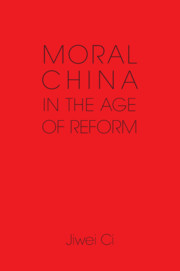Book contents
- Frontmatter
- Dedication
- Contents
- Acknowledgments
- Introduction
- 1 An Anatomy of the Moral Crisis
- 2 Political Order, Moral Disorder
- 3 Freedom as a Chinese Question
- 4 Freedom and Its Epistemological Conditions
- 5 Freedom and Identification
- 6 Neither Devotion Nor Introjection
- 7 The Insult of Poverty
- 8 Democracy as Unmistakable Reality and Uncertain Prospect
- 9 Freedom’s Unfinished Task
- 10 China’s Space of Moral Possibilities
- Index
- References
9 - Freedom’s Unfinished Task
Published online by Cambridge University Press: 05 September 2014
- Frontmatter
- Dedication
- Contents
- Acknowledgments
- Introduction
- 1 An Anatomy of the Moral Crisis
- 2 Political Order, Moral Disorder
- 3 Freedom as a Chinese Question
- 4 Freedom and Its Epistemological Conditions
- 5 Freedom and Identification
- 6 Neither Devotion Nor Introjection
- 7 The Insult of Poverty
- 8 Democracy as Unmistakable Reality and Uncertain Prospect
- 9 Freedom’s Unfinished Task
- 10 China’s Space of Moral Possibilities
- Index
- References
Summary
1
Freedom, as understood and discussed in this book, does not mark the so-called end of history, with all that this admittedly elusive yet by no means vacuous concept implies. It only marks our place in the modern world – or brings us into it. To be free is the only way to be human under modern conditions of life. But what exactly are modern conditions of life? Do they not signal the end of history, a very symptom of the end of history? Do they not have a history that foretells what modern conditions of life can mean or amount to, and that forestalls or forecloses whatever possibility for substantial and meaningful agency we may think is open to us with our newfound freedom? Questions such as these are unavoidable given freedom’s ambiguous track record and its ambiguous relation to the good, and they add up to the imperative to treat freedom not as the panacea it is often so complacently taken to be but as a question – as perhaps the most important question for the modern human being.
But why must the modern human being confront this question in the first place? Or, what does it mean to say, as I have done, that to be free is the only way for us to act and to be under modern conditions of life?
- Type
- Chapter
- Information
- Moral China in the Age of Reform , pp. 182 - 186Publisher: Cambridge University PressPrint publication year: 2014

